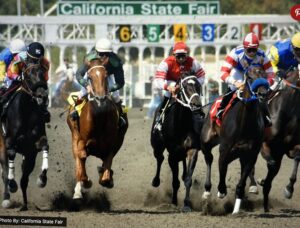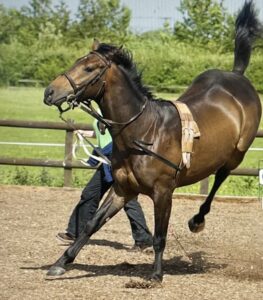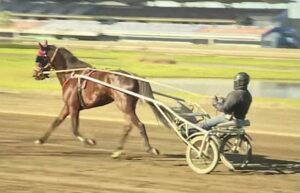 Last week’s post garnered a lot of interest, and I thank you. Tim Bellasis’s memory of the Cal Expo Flood of 1989 made for a gripping short story I enjoyed writing. It was suggested that there are a vast number of memories among the horsemen and women who work with our beloved racehorses that should be shared and not allowed to be lost to the changing times. Remember, a good story is a gift you get to give over and over again, and each time, you get to relive the moment yourself. If any of you have a memory about an event, a person, or a horse . . . that you would like to share, I will pick one that I feel will appeal to a large audience. When I’ve picked just one, I will do my best to make a fictionalized short story based on your facts. Please reach out to me through the Ask Shelley tab and leave a brief description of the incident.
Last week’s post garnered a lot of interest, and I thank you. Tim Bellasis’s memory of the Cal Expo Flood of 1989 made for a gripping short story I enjoyed writing. It was suggested that there are a vast number of memories among the horsemen and women who work with our beloved racehorses that should be shared and not allowed to be lost to the changing times. Remember, a good story is a gift you get to give over and over again, and each time, you get to relive the moment yourself. If any of you have a memory about an event, a person, or a horse . . . that you would like to share, I will pick one that I feel will appeal to a large audience. When I’ve picked just one, I will do my best to make a fictionalized short story based on your facts. Please reach out to me through the Ask Shelley tab and leave a brief description of the incident.
I’ll start with my own memory, though I haven’t fictionalized it. It’s a true story; many of you will remember Sam Johnson, his wife Audrey, and their two boys. However, I’m sad to add that I believe he lost both of his boys at way too young an age.
Jim and I had just started training at Cal Expo, and as I recall, it was in the late 1970s or early 1980s. I hope you enjoy my memory. (The pictures below are not of Sam, but they give you an idea.)
Sam’s Stories
THOSE HOURS BEFORE THE SUN ROSE IN THE sky were my favorite at the racetrack. When viewed from afar, the horses standing backlit in the doorway of each stall resembled traditional silhouette portraits come to life as shadow theatre. Pawing and whinnying, they all wanted to be first as the cans of grain were doled out.
Once the grain had been distributed, the clamor settled into the quiet munching of hungry equines. Some nibbled and chewed quietly, savoring each morsel. While others gobbled their ration, barely tasting the treat, they’d rattle and bang their empty tubs, demanding more.
I used this short interlude of relative calm to prepare equipment for the day ahead. The blanket rack was hung, and saddles, pads, and bridles were set out on the saw horse.
Buckets of hot, soapy water were readied, and sweat scrapers and fluffy sea sponges dropped into the bubbles. Grooms rolled out wheelbarrows, carrying rakes and pitchforks to muck out the stalls.
When a golden pink edge showed on the horizon, the horses were curried, tacked, and ready to go.
As the first horses stepped onto the freshly harrowed surface, they paused, ears pricked, nostrils flared. Eyes fixed on something unseen and far away, muscular bodies taut with anticipation, they seemed to listen to sounds only they could hear.
Soon, the track would fill with excited horses, a hive of activity as every trainer struggled to track all their charges before the training period ended.
Over the years, I’d been neighbors with several notable characters whose temperaments differed greatly from mine. Some were particularly memorable, but none more so than Sam Johnson. As far as interesting went, it would be hard to beat ol’ Sam. I don’t know how old he was; I couldn’t hazard a guess, but seeing as I was just twenty-six years old when I first met him, he seemed ancient to me at the time.
Sam had a uniform he wore daily. Every item consisted of faded khaki, including the floppy hat he wore without fail. We shared a hot walker next to the barn, and as we watched our horses cool out, he loved to share his recollections.
A prolific storyteller, Sam’s old memories just flowed off his tongue. He painted a picture with his words, and those words frequently engaged my imagination. Unlike most older people I’d met, Sam never told the same story twice. His repertoire was vibrant and varied.
Most people judged Sam by his looks. Both cataract-covered eyes bulged—one looked to the left and the other at his feet. The bottom lid on the right eye had a large divot of flesh missing, and as a result, the eye watered steadily—a stream of tears that coursed over his cheek to decorate his khaki-colored jacket.
He carried a crumpled and disreputable handkerchief tucked in his back pocket—a stained flag at the ready, which followed him everywhere.
From what I could see, only one tooth remained in Sam’s mouth. Located in the middle of his bottom jaw, mottled yellow and brown with age, it angled out, and his top lip stayed tucked behind it. Mumbling through chapped lips, it was often difficult to make out his words.
My husband, Jim, couldn’t understand why I’d listen to anything ol’ Sam had to say. Like the rest of Sam’s critics, Jim felt the horse business had moved past the elderly man and considered him little more than a derelict and, as such, no longer relevant.
But I found Sam remembered things long forgotten by his more youthful colleagues, those who’d been seduced by the lure of cutting-edge technologies and were often dependent on new medications to do a good deal of the training for them.
I might have to listen to fifty stories to glean one helpful gem, but I didn’t find that to be a hardship. Sam was also a gentle soul with a rather pointed sense of humor that I thoroughly enjoyed.
 He only had a couple of good clients left, but they’d been with him for a long time, and they’d kept the faith. One spring, his best client sent Sam a very nice two-year-old colt to break and train.
He only had a couple of good clients left, but they’d been with him for a long time, and they’d kept the faith. One spring, his best client sent Sam a very nice two-year-old colt to break and train.
Truthfully, I thought this big, rambunctious colt would get the best of the ol’ guy. And sure enough, one day, the colt reared up, struck Sam with his front hooves, and thunked him a good one, right on the top of his head. The floppy hat never budged.
In response to my shriek of alarm, Jim burst through the tack-room door and caught the loose horse while I helped Sam to his feet.
Sam sported a nasty red scrape but, surprisingly, seemed none the worse for wear. He pulled his disreputable hanky out of his pocket, wiped his nose, and stepped over to reclaim the feisty colt from Jim.
As the days passed, the young horse became more of a problem. He had obvious talent but was turning into an uncontrollable rogue, both around the barn and on the track.
One by one, Sam had recruited every gallop boy on the backside to exercise the colt. And one by one, they all met the same ignominious fate—unseated with Sam’s unruly scamp running loose. Eventually, Sam approached Jim. When Sam told Jim he wouldn’t allow him to carry a whip while riding the colt, he refused.
The nasty-tempered animal liked nothing better than to rub a rider off using any solid surface he could get next to, which left riding the undisciplined colt without a whip both foolish and reckless.
Though I felt sorry for Sam, I agreed with Jim; it wasn’t worth getting busted up on an ill-mannered baby for the small fee Jim would earn.
 The next thing I knew, I looked up to see Sam headed off to the track leading the obnoxious colt hooked up to a harness-racing sulky. I couldn’t believe my eyes.
The next thing I knew, I looked up to see Sam headed off to the track leading the obnoxious colt hooked up to a harness-racing sulky. I couldn’t believe my eyes.
Frankly, I was more than a little surprised Sam wasn’t already dead and the horse down on the ground tangled up in the remains of the buggy.
Since everybody knew the colt was as wild as a March Hare, what was about to take place had all the earmarks of a clear case of suicide by stupidity and right in front of all our eyes.
Hooking any horse to a buggy without a lot of prep work was just plain idiotic, let alone a green two-year-old thoroughbred with a bad attitude.
Word spread rapidly around the barn area, and everybody who could raced to the rail to watch the smackdown. The buzz of excited voices ceased abruptly when the colt stepped onto the track at the three-quarter chute, dragging the cart with big ol’ Sam now in the driver seat.
The colt stood there, frozen in place. The railbirds held their breath, eyes riveted, unblinking, for fear of missing the launch.
The colt looked right, then left. He lifted a front leg. The ghoulish audience leaned further over the rail, straining to catch all the action. At this point, the colt, as though he’d done it a thousand times before, walked up the track, broke into a jog, and finally a gallop.
Sam trained that horse using a buggy for weeks on end. When he finally put a rider on the colt’s back and took him to the track for the first time without the sulky, the colt galloped around the track like an old campaigner.
Eventually, the colt went on to win a few races, making money for his owner.
Stable characters have come and gone, and I still remember how colorful and unique ol’ Sam had been, dressed in his faded khaki uniform.
Though people disagreed with his tactics, Sam was secure in his unorthodox style. He didn’t care if anyone thought he was relevant or not. But after the day of the sulky, no one could deny that there was more than one way to train a racehorse.
As for Sam, he always had another story to tell. That is, if anybody was willing to listen.
Thank you for taking the time to visit my website. I hope you enjoyed Sam’s Stories, and I wish I had a picture to share with you, but sadly I don’t. However, Sam will always hold space in my memory. Feel free to ask if you have a question about the Triple Crown of horseracing or might be interested in any aspect of writing. Or . . . do you have a good story that you would like to share? I just wanted to let you know that I won’t sell or use your contact information.
Truly enjoyed Sam’s story!! I could easily picture the old gentleman from your descriptions!! I will be reading more of your stories and books in the future. Thank you!
Thank you, Cynthia, for visiting my website; it is truly an honor. I can still picture Sam in my mind’s eye. When I was having trouble with a young horse, I would often filter through those old stories of Sam’s and see if there was anything there that might help me. You’d be surprised how often there was. Simple things, things that most people had come to ignore or forgotten. Take care, Shelley
What a novel approach to his troubles. And to be successful. Glorious. Thank you for sharing this aspect of a horseman cut of cloth I appreciate. Fugal yet successful.
I remember a horse he brought along to a successful career. Watch Wendy.
Racing from 8/79 to 7/83
Retired with $233,157 in earnings.
42 15 10 5
GGF for many years had a stakes named after her.
Cassy, Thank you for taking the time to remember Sam. I didn’t get to know him in his younger days. But I am certainly glad that I got to know him at all. He was more than an unusual character; he was special. Take care, Shelley
Ohhh … Sam was such a gem of a man! It makes me happy to read about the kindness and respect you had for him, disreputable handkerchief and all! (Although it doesn’t surprise me!!) Thank you for sharing this wonderful story.
Hi Val, You’re the best, have I told you that lately? I’m glad you enjoyed Sam’s Stories.
I remember hearing stories that there was a time when Sam was the strongest man around and he would show off by tossing full sacks of oats onto the roof of the barns in Vallejo. If nothing else, it was a good story.
Thanks for sharing your story. I loved every word.
Hi Joell, I didn’t have the opportunity to meet Sam when he was young. But as an older man, he was still a fairly big guy. I could believe he did what you say, and wouldn’t that have been a sight to see? I am thrilled to hear that you enjoyed my Stories from the Backside. I plan to post a few more in the coming weeks. Take care, Shelley